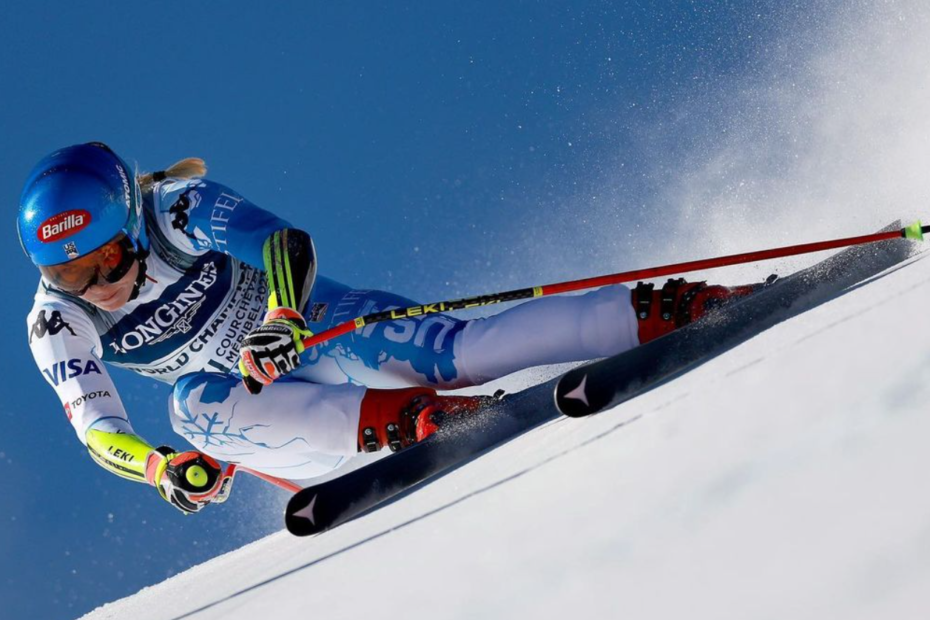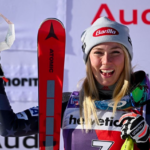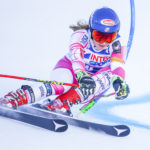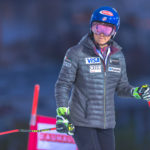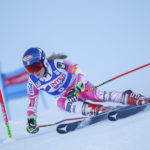Mikaela Shiffrin is having one of the best World Cup seasons of her legendary and illustrious career. The season was supposed to start on October 22, 2022, but got delayed until November 19th due to bad weather. When competition resumed, Shiffrin didn’t waste any time in showing the world who she is.
She entered the season with 74 career World Cup wins under her belt, which was the second-most Alpine Skiing World Cup wins of all-time – the record was held by her friend, Lindsey Vonn, at 82 career wins. Over the course of the next few months, she not only broke that record, but has continued to add onto it.
As of February 11, Mikaela Shiffrin has 85 World Cup wins in her career and has established herself as one of, if not the greatest alpine skier of all-time. She also has an opportunity to surpass her own record of 17 World Cup wins in a single season – a record she set during the 2019 FIS Alpine Ski World Cup.
Mikaela Shiffrin Already Has 11 World Cup Wins in 2023
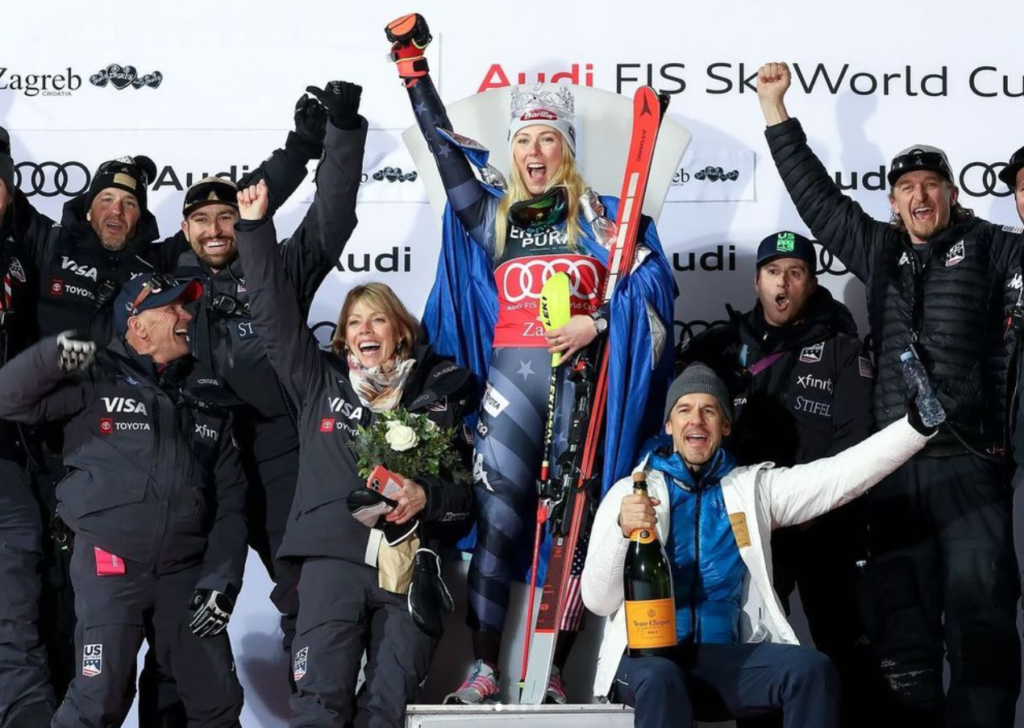
Mikaela Shiffrin already has 11 wins this season – out of a possible 28 races – and there are still seven races remaining before the FIS World Cup Season Final, which consists of another four races. Of course, that doesn’t include the six races in the FIS World Championships, which are being held February 6-18.
It was bound to be a successful season from the start, having won the first two races of the season on November 19 and November 20. She went winless in the next nine races, but kicked it into high gear with five consecutive wins between December 18 and January 4 as she closed in on Lindsey Vonn’s record.
She won again four days later on January 8 before going winless in the next six races, but returned to her winning ways with three consecutive victories on January 24 (the record-breaker), January 25, and January 28. Don’t worry, we’re going to take a closer look at each of her 11 World Cup wins this season.
1. Slalom at Levi Black on November 19
On November 19, Mikaela Shiffrin snagged her first win of the season in what was the first race of the season – starting things off on the right foot. She finished with a winning time of 1:51:25 – 0.16 seconds ahead of second place (Anna Swenn Larson) and 0.20 seconds ahead of third place (Petra Vlhova).
Shiffrin opened up the first run with a time of 55.03 seconds, which was 0.55 seconds behind the leader (Lena Duerr). She had the 7th-best run in the first sector, the best run in the second sector, the 12th-best run in the third sector, and the third-best run in the final sector. She was behind, but it didn’t last too long.
Her second run was enough to pull away, finishing with a time of 56.22 seconds – 0.18 seconds ahead of second place (Petra Vlhova). She had the 7th-best run in the first sector, the 4th-best run in the second sector, the best run in the third sector, and the third-best run in the fourth sector. She was impressive.
It was Shiffrin’s 75th World Cup win, 48th victory in the slalom discipline, and 67th podium in the slalom discipline. She won her fifth reindeer at Levi and, as tradition states, named her reindeer Sunny (after a teammate). She also earned 100 points for the victory, which are accumulated throughout the season.
2. Slalom at Levi Black on November 20
On November 20, Mikaela Shiffrin snagged her second win of the season, starting the 2022-23 season with back-to-back victories – 2 for 2 in Levi! She finished with a winning time of 1:52.21 – 0.28 seconds ahead of second place (Wendy Holdener) and 0.68 seconds ahead of third place (Petra Vlhova).
Shiffrin opened up with a time of 56.86 seconds in her first run, which was just 0.07 seconds better than second place (Lena Duerr). She had the 2nd-best run in the first sector, fell off a bit with the 16th-best run in the second sector, then finished strong with the 5th-best run in Sector 2 and the best run in Sector 3.
Her second run was much better, finishing with a time of 55.35 seconds – just 0.07 seconds better than second place (Wendy Holdener). Shiffrin had the 3rd-best run in Sector 1, but struggled in Sector 2 with the 14th-best run. That didn’t matter as she had the best run in the final two sectors to run away with it.
It was Shiffrin’s 76th World Cup win, 49th win in the slalom discipline, and 68th podium in the discipline. She also won her sixth reindeer, which she named Lorax in honor of her late father and immediate family. She secured another 100 points to give her 200 on the season – 75 ahead of second place (Holdener).
3. Super-G at Corviglia on December 18
On December 18, after nine-straight winless races, Mikaela Shiffrin found herself back atop the podium at Corviglia in St. Moritz, Switzerland. She finished with a winning time of 1:13.62, which was 0.12 seconds ahead of second place (Elena Curtoni) and 0.40 seconds ahead of third place (Romane Miradoli).
She got off to a hot start right out of the gate, finishing with the best run in the first sector at 21.45 seconds – 0.05 seconds ahead of Wendy Holdener. She had the 11th-best run in Sector 2, but followed that up with the best run in Sector 3 (18.56 seconds) and third-best run in Sector 4 (14.69 seconds).
It was Shiffrin’s 77th World Cup win, but just her 5th World Cup win in the Super-G discipline and 2nd career win in St. Moritz – and first Super-G win of the season. She scored 100 points for the win, which put her in fourth place in the event (100 points total) and first place overall (575 points on the season).
4. Giant Slalom at Panorama on December 27
On December 27, Mikaela Shiffrin snagged her second back-to-back victory of the season at Panorama in Semmering, Austria. She finished with a winning time of 2:07.18, which was just 0.13 seconds in front of second place finisher Petra Vlhova and 0.31 seconds ahead of third place finisher Marta Bassino.
Shiffrin opened the race with an incredible first run of 1:05.49 – 0.72 seconds ahead of the next closest finisher. She had the best run in each of the first three sectors, scoring a 13.49 in Sector 1, 23.40 in Sector 2, and 14.88 in Sector 3. Her 13.72 in Sector 4 was 7th-best, but she still had the best Run 1 time.
Her second run wasn’t as good as the first, but it didn’t matter. She had the fifth-best time in Run 2 at 1:01.69 – 0.59 seconds behind the leader. She had the top run in the first sector and had a 0.15-second lead, but finished with the 9th-best run in Sector 2, 12th-best run in Sector 3, and 6th-best run in Sector 3.
It was Shiffrin’s 78th World Cup victory, 15th career Giant Slalom victory, first Giant Slalom victory since December 21, 2021, and 5th career win at this venue. She earned 100 points for the win, putting her in 5th place in the discipline (160 points total) and first place overall with 675 points on the season.
5. Giant Slalom at Panorama on December 28
On December 28, Mikaela Shiffrin secured her third consecutive victory and second consecutive Giant Slalom win at Panorama in Semmering, Austria. She finished with a time of 2:03.51 – just 0.10 seconds ahead of second place (Lara Gut-Behrami) and 0.47 seconds ahead of third place (Marta Bassino).
She found herself in second place after the first run with a time of 59.45 seconds – just 0.22 seconds behind Gut-Behrami, who was the only other skier to finish in under a minute. Shiffrin had the best time in the first and third sectors, but finished with the 4th-best time in Sector 2 and 7th-best time in Sector 4.
Her second run was much more disappointing, but it didn’t matter because Gut-Behrami did even worse. Shiffrin had the 8th-best time in Run 2 at 1:04.06, but got off to a good start. She had the 2nd-best run in Sector 1 and top run in Sector 2, but just the 26th-best time in Sector 3 and 23rd-best time in Sector 4.
It was Shiffrin’s 79th World Cup victory, 16th career Giant Slalom victory (tied-2nd all-time in this event), second Giant Slalom victory of the season, and 6th career win at this venue. She finished with 100 points, putting her in 2nd place in the discipline (260 points) and maintaining first place overall (775 points).
6. Slalom at Panorama on December 29
On December 29, Mikaela Shiffrin extended her winning streak with her fourth straight win and third consecutive win at Panorama in Semmering, Austria. She finished with a winning time of 1:43.26 – 0.29 seconds ahead of second place (Paula Moltzan) and 0.34 seconds ahead of third place (Lena Duerr).
She gave herself a good cushion out of the gate with a 49.82 first run, which was 0.72 seconds ahead of the next closest finisher (Anna Swenn Larsson). She had the 2nd-best time in Sector 1, but cleaned up the rest of the way with the best time in the second, third, and fourth sectors – she was unstoppable.
Her second run was much worse, but was still enough to pull out a win. She finished with a time of 53.44 seconds, which was 0.84 seconds behind the leader (Franziska Gritsch). Shiffrin had just the 23rd-best time in Sector 1, 10th-best time in Sector 2, 4th-best time in Sector 3, and 21st-best time in Sector 4.
It was Shiffrin’s 80th World Cup victory, 50th win in the Slalom discipline (extending her all-time record), third Slalom victory of the season, 70th podium finish in the event, and seventh win at this venue. She secured 100 points, putting her in 1st place in the event (425 points) and 1st place overall (875 points).
7. Slalom at Crveni Spust on January 4
On January 4, Mikaela Shiffrin kept the ball rolling with her fifth consecutive World Cup victory at Crveni Spust in Zagreb, Croatia. She finished with a winning time of 1:36.42, which was 0.76 seconds better than the second place finisher (Petra Vlhova) and 1.21 seconds faster than third place (Anna Swenn Larsson).
She gave herself a pretty good cushion with a time of 48.93 seconds in the first run, which was 0.28 seconds better than the next closest (Swenn Larsson). She had the second-best time in the first two sectors (12.58s in Sector 1 and 17.59s in Sector 2) and the best time in the third sector (18.76 seconds).
Shiffrin fell off a bit in the second run, finishing with a time of 47.49 seconds – which was 0.34 seconds off the leader (Laurence St-Germain). Her first sector was horrendous with the 17th-best time, but she bounced back (as she always does) with the 3rd-best time in Sector 2 and 5th-best time in Sector 3.
It was Shiffrin’s 81st World Cup victory, 51st victory in the Slalom discipline (extending her all-time record), fourth Slalom win of the 2022-23 season, and 71st podium finish in the discipline. She gained 100 points, remaining in first place in the Slalom (525 points) and first place overall (975 points).
8. Giant Slalom at Podkoren 3 on January 8
On January 8, after watching her win streak come to an end the day prior, Mikaela Shiffrin returned to the top of the podium at Podkoren 3 in Kranjska Gora, Slovenia. She finished with a time of 1:52.53 – 0.77 seconds better than 2nd place (Federica Brignone) and 0.97s better than 3rd place (Lara Gut-Behrami).
Shiffrin started her first run with a time of 55.30 seconds, which was 0.24 seconds ahead of the next closest skier (Brignone). She had the best time in the first and third sectors (17.29 in Sector 1 and 14.51 in Sector 3), the second-best time in Sector 2 (13.34s) and fifth-best time in the final sector (10.16s).
As if you’d expect anything else, she walked away with the best time of the second run, as well – 57.23 seconds, which was 0.20s ahead of 2nd place (Gut-Behrami). She had the 2nd-best time in Sector 1 and followed it up with the best time in Sectors 2 and 3 before finishing with the 16th-best time in Sector 4.
It was Shiffrin’s 82nd World Cup victory, which tied Lindsey Vonn’s all-time record. It was also her 17th career Giant Slalom victory, putting her in sole possession of 2nd place all-time. She secured another 100 points, putting her in second place in the discipline (400 points) and first place overall (1,115 points).
9. Giant Slalom at Erta on January 24
On January 24, after failing to win in the previous six races (she had one podium finish in that span), Mikaela Shiffrin earned her ninth victory of the season at Erta in Kronplatz, Italy. She ran a 2:00.61 on the day – 0.45 seconds ahead of 2nd place (Gut-Behrami) and 1.43 seconds ahead of 3rd place (Brignone).
She gave herself a modest lead after the first run, finishing with a time of 58.72 seconds – 0.13 seconds ahead of the next closest (Gut-Behrami). She had the best time in the first (15.09s) and fourth (16.86s) sectors, the 6th-best time in Sector 2 (10.01s), and the 3rd-best time in Sector 3 (16.76s) to round it out.
Shiffrin kept her momentum going into the second run, finishing with the best time of 1:01.89 – which was 0.26 seconds ahead of second place (Sara Hector). She had the 5th-best time in Sector 1 and 7th-best time in the second sector, but cleaned up with the 3rd-best time in Sector 3 and best time in Sector 4.
It was Shiffrin’s 83rd World Cup victory, officially breaking Vonn’s record – an incredible achievement. It was also her 18th career Giant Slalom victory and second consecutive Giant Slalom win. She gained 100 points, putting her in first place in the Giant Slalom (500 points) and first place overall (1,417 points).
10. Giant Slalom at Erta on January 25
On January 25, Mikaela Shiffrin earned her second back-to-back victory of the season – going 2 for 2 at Erta in Kronplatz, Italy. She finished with a winning time of 2:03:28, which was 0.82 seconds better than second place (Ragnhild Mowinckel) and 1.19 seconds better than third place (Sara Hector).
Her first run was a special one, finishing with the top time of 1:00.56 – 0.51 seconds ahead of the next closest (Hector). She had the best time in the first (14.27 seconds) and fourth (17.98 seconds) sectors, the second-best time in Sector 2 (10.50 seconds), and fourth-best time in Sector 3 (17.81 seconds).
The second run wasn’t as impressive for Shiffrin, but it was still the 3rd-best at 1:02.72 – 0.42 seconds off the leader (Gut-Behrami). She got off to a great start and had the best time in Sector 1 and third-best time in Sector 2, but took the backseat with the 22nd-best time in Sector 3 and 5th-best time in the final sector.
It was Shiffrin’s 84th career World Cup victory (extending her all-time record), 19th Giant Slalom victory (one behind the all-time leader), and third consecutive Giant Slalom win. She secured another 100 points as she remained in first place in the discipline (600 total points) and first place overall (1,517 total points).
11. Slalom at Černá Svatý Petr on January 28
On January 28, Mikaela Shiffrin earned her second back-to-back-to-back victory of the season and 11th victory overall. She finished with a winning time of 1:33.85, which was 0.60 seconds better than second place finisher Lena Duerr and 1.31 seconds better than third place finisher Wendy Holdener.
She set the tone with her first run, finishing with a time of 48.19 seconds – 0.29 seconds better than Duerr, who had a time of 48.48 seconds. Shiffrin had the best time in the first (13.19 seconds) and third (11.79 seconds) sectors, the 3rd-best time in Sector 2 (12.13s), and 4th-best time in Sector 4 (11.08s).
Her second run was just as impressive, finishing with a time of 45.66 seconds – which was tied with Leona Popovic and 0.05 seconds better than second place (Paula Moltzan). She had the 11th-best time in Sector 1, 13th-best time in Sector 2, fourth-best time in Sector 3, and the best time in the fourth sector.
It was Shiffrin’s 85th career World Cup victory, 52nd career Slalom victory, 72nd Slalom podium, and 5th Slalom victory of the season. She gained 100 points, maintaining first place in the discipline (705 points) and first place overall (1,617 points). She also came in 2nd place in the Slalom the following day.
What’s Next for Mikaela Shiffrin in 2023?
Mikaela Shiffrin is currently in her 12th World Cup season and, while it has been a special one, it’s far from over. She’s currently competing in the FIS World Championships and hasn’t secured a win through the first three races, but placed second on February 8th in the Super-G race at Roc de Fer in Méribel.
The World Championships continue on February 15, 16, and 18 – at which point Shiffrin’s attention will shift back to the 2022-23 World Cup season. She’ll have seven opportunities to add to her 11 victories this season and another four races once the FIS World Cup Season Final – taking place March 15-19.
YOU MAY ALSO LIKE: Mikaela Shiffrin Opens Up About Her Struggles at the 2022 Winter Olympics
As of February 11, she’s in first place overall with 1,697 points through 28 of 39 races – she’s a whopping 731 points ahead of second place Petra Vlhová of Slovakia. She’s also in first place in the Giant Slalom (600 points) and the Slalom (785 points). In addition to her 11 victories, she has come in 2nd three times.
Mikaela Shiffrin Inches Closer to Lindsey Vonn’s Record With Career Win No. 80 and 15 of the Other Greatest Female Skiers of All-Time
Mikaela Shiffrin is proving why she’s one of the greatest female skiers of all time with her performances at the 2022–23 FIS Alpine Ski World Cup. She entered the 2022-23 season with 74 career victories at the World Cup – dating back to the 2012-13 season – and has already secured 6 more victories in 2022-23.
With 80 career victories as of December 30, 2022, Shiffrin is just 2 wins away from tying Lindsey Vonn for the most all-time (among females). The two former teammates have dominated the World Cup like no one else – with Vonn at 82 and Shiffrin at 80, the next closest female is Annemarie Moser-Pröll at 62.
4 of Shiffrin’s 6 victories this season have come in the past month. She closed out 2022 with four-straight wins – starting with the Super-G format in St. Moritz, Switzerland on December 18th. She then went 3-0 in Semmering, Austria – winning the Giant Slalom twice before snatching her 50th career slalom win.
RELATED: 25 US Winter Olympics Athletes Who Have Proven Themselves Already
Mikaela Shiffrin is Among the Greatest Female Skiers of All-Time
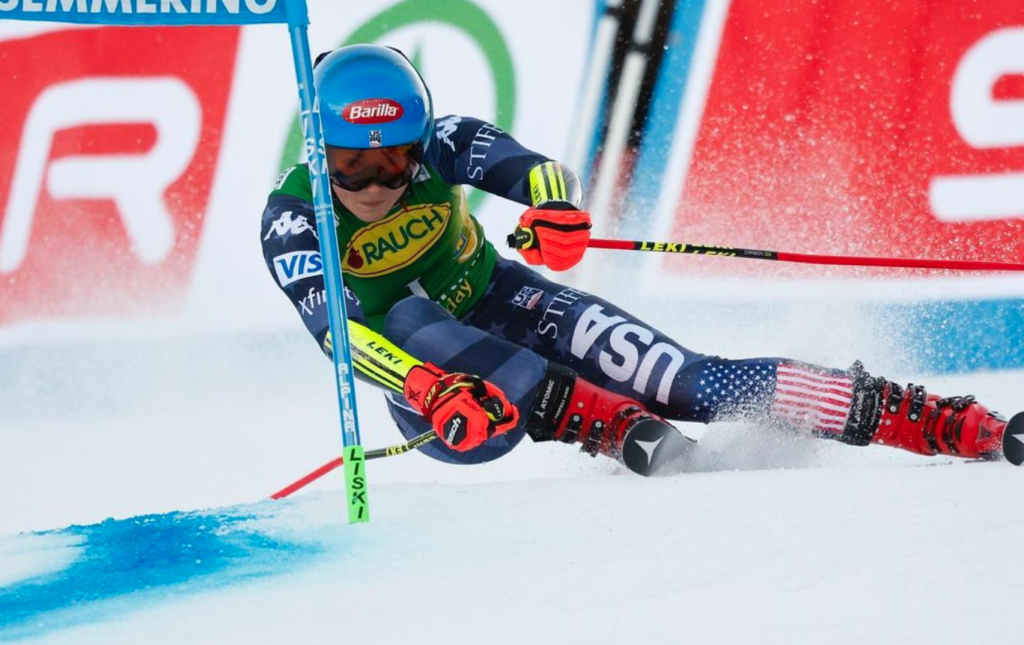
Mikaela Shiffrin has already put together one of the most incredible skiing careers of all time – a career only a few skiers can match. She made her World Cup debut in 2011, her World Championships debut in 2013, and her Olympic debut in 2014. It didn’t matter where she was competing, Shiffrin won everywhere.
In addition to her 80 wins, Shiffrin has won four overall World Cup titles, 11 World Championships medals (6 gold, 2 silver, 3 bronze), and three Olympic medals (2 gold, 1 silver) – despite her disappointing and medal-less performance at the 2022 Winter Olympics in Beijing, China. Still, she has a lot of hardware.
With four consecutive World Cup victories between December 18 and 28, Shiffrin needs just three more wins to stand alone atop the all-time leaderboard. While we wait for the next batch of events this season, let’s take a look at some of the other greatest female skiers of all-time – where will Mikaela Shiffrin rank?
15. Lara Gut-Behrami
Lara Gut-Behrami is an active alpine skier from Switzerland who made her World Cup debut in 2007, World Championships debut in 2009, and Olympic debut in 2014. Her last win in the World Cup came on November 26, 2022 in the Giant Slalom – it was her first World Cup victory of the 2022-23 season.
At 31 years old, Gut-Behrami now has 35 World Cup wins under her belt – as well as 67 podium finishes and an overall title in 2016. She has earned seven total medals (2 gold, 3 silver, 3 bronze) at the World Championships and three medals (1 gold, 2 bronze) at the Winter Olympics – including a gold in 2022..
14. Rosi Mittermaier
Rosi Mittermaier is a retired alpine skier from Germany who made her World Cup debut in 1967, World Championships debut in 1968, and Olympic debut in 1968. Her racing career came to an end in 1976 after winning the World Cup overall title at just 25 years old – it was the epitome of going out on top.
Mittermaier retired with 10 World Cup wins and 41 podium finishes, but her 1976 overall title was her prized possession. To make that 1976 season that much sweeter, she famously won a gold medal at the 1976 World Championships and three more medals at the 1976 Olympics (including 2 gold and 1 bronze).
13. Marlies Schild
Marlies Schild is a retired alpine skier from Austria who made her World Cup debut in 2001, World Championships debut in 2003, and Olympic debut in 2002. While she never won an overall title at the World Cup, she did win five discipline titles – including the Slalom title four times and the combined once.
Schild earned 37 career World Cup victories and 68 podium finishes in her career. She never won an Olympic gold medal, but managed to take home three silver medals and one bronze medal. Schild also won two gold medals, three silver medals, and two bronze medals at the World Championships.
12. Renate Götschl
Renate Götschl is a retired alpine skier from Austria who made her World Cup debut in 1992, World Championships debut in 1996, and Olympic debut in 1998. Her career came to an end in 2009 after her worst World Cup finish since her rookie season – she went down as one of the greatest to ever do it.
Götschl retired with 46 World Cup victories (ranks 5th-most all-time), 10 World Cup discipline titles, and a World Cup overall title in 2000. She also found success at the Olympics – a silver medal and bronze medal in 2002 – and the World Championships – 3 gold medals, 4 silver medals, and 2 bronze medals.
11. Katja Seizinger
Katja Seizinger is a retired alpine skier from Germany who made her World Cup debut in 1989, World Championships debut in 1991, and Olympic debut in 1992. She’s the most successful German alpine skier ever. Her career came to a halt after injuring both knees while training ahead of the 1999 season.
She retired with 36 World Cup victories, 76 podium finishes, 9 discipline titles, and 2 overall titles – including 1996 and 1998, the year before her injury. She also added a gold medal and 3 silver medals at the World Championships, as well as 3 gold medals and 2 bronze medals at the Winter Olympics.
10. Erika Hess
Erika Hess is a retired alpine skier from Switzerland who made her World Cup debut in 1978, World Championships debut in 1978, and Olympic debut in 1980. She made two Olympic appearances, winning a bronze medal (slalom) in 1980 and placing fifth in 1984 – she also placed seventh in the Giant Slalom.
Hess retired with 31 World Cup victories and 76 podium finishes between 1978 and 1987 – she added 6 discipline titles and two overall titles (1982 and 1984). She was dominant at the World Championships, earning 6 gold medals between 1982 and 1987 – three of those gold medals came in 1982.
9. Tina Maze
Tina Maze is a retired alpine skier from Slovenia who made her World Cup debut in 1999, World Championships debut in 2001, and Olympic debut in 2002. She made four appearances at the Winter Olympics and won four total medals as a result – including two gold medals and two silver medals.
In addition to her success at the Olympics, Maze won nine total medals (four gold medals and five silver medals) at the World Championships. She was also dominant at the World Cup, where she earned 26 career wins, 81 podium finishes, two discipline titles (both in 2013), and an overall title in 2013.
8. Deborah Compagnoni
Deborah Compagnoni is a retired alpine skier from Italy who made her World Cup debut in 1986, World Championships debut in 1989, and Olympic debut in 1992. She’s considered the greatest Italian female skier of all-time, having won three gold medals, one silver medal, and one bronze medal at the Olympics.
Compagnoni is also the winner of three gold medals at the World Championships – one coming in 1996 and two more coming in 1997. She retired with 16 career wins at the World Cup, as well as 44 podium finishes and one discipline title – Giant Slalom in 1997. Despite injuries, she never stopped competing.
7. Hanni Wenzel
Hanni Wenzel is a retired alpine skier from Liechtensteiner who made her World Cup debut in 1972, World Championships debut in 1974, and Olympic debut in 1976. She made two Olympic appearances, winning two gold medals, a silver medal, and a bronze medal – her nation’s first ever Olympic medals.
She was dominant at the World Championships between 1974 and 1982, winning two gold medals, two silver medals, and one bronze medal. As for the World Cup, she earned herself 89 career podium finishes – including 33 victories, 5 discipline titles, and 2 overall titles (1978, 1980). She was consistently good.
6. Vreni Schneider
Vreni Schneider is a retired alpine skier from Switzerland who made her World Cup debut in 1984, World Championships debut in 1985, and Olympic debut in 1988. She made three Olympic appearances in her career, winning three gold medals, one silver medal, and one bronze medal between 1988 and 1994.
Schneider also won three gold medals, two silver medals, and one bronze medal at the World Championships between 1985 and 1991 – coming in fourth place twice. She also earned 101 podium finishes at the World Cup – including 55 wins (4th-most all-time), 11 discipline titles, and 3 overall titles.
5. Annemarie Moser-Pröll
Annemarie Moser-Pröll is a retired alpine skier from Austria who made her World Cup debut in 1969, World Championships debut in 1970, and Olympic debut in 1972. She made two Olympic appearances – she missed the 1976 Olympics – in her career and won a gold medal and two silver medals as a result.
Outside of the Olympics, Moser-Pröll won four gold medals and one bronze medal at the World Championships. A majority of her success, however, came at the World Cup – where she had 113 podium finishes, 62 wins (3rd-most all-time), 12 discipline titles, and six overall titles (including five consecutive).
4. Anja Pärson
Anja Pärson is a retired alpine skier from Sweden who made her World Cup debut in 1998, World Championships debut in 1999, and Olympic debut in 2002. She appeared in three Olympics between 2002 and 2010, winning a gold medal (2006), silver medal, and four bronze medals in the process.
Pärson was absolutely dominant at the World Championships, winning 13 total medals between 1999 and 2011 – including seven gold medals, two silver medals, and four bronze medals. She spent 15 seasons in the World Cup, earning 95 podium finishes, 42 wins, 5 discipline titles, and 2 overall titles (2004, 2005).
3. Janica Kostelić
Janica Kostelić is a retired alpine skier from Croatia who made her World Cup debut in 1998, World Championships debut in 1999, and Olympic debut in 1998. She appeared in three Olympics during her career, winning six total medals (four gold medals and two silver medals) – most of which came in 2002.
Kostelić was no stranger to gold medals, winning another five golds at the World Championships – three of which came in 2005. While injuries cut her career short, she managed to secure 55 podium finishes, 30 wins, seven discipline titles, and three overall titles (2001, 2003, 2006) in eight seasons in the World Cup.
2. Mikaela Shiffrin
Mikaela Shiffrin – the woman of the hour – is an active alpine skier from the United States who made her World Cup debut in 2011, World Championships debut in 2013, and Olympics debut in 2014. She has made three Olympic appearances during her career, winning three total medals (two gold, one silver).
Shiffrin has dominated the World Championships since 2013, winning 11 total medals (six gold, two silver, and three bronze) – and counting. She has also dominated the World Cup, earning 127 podium finishes, 80 wins (2nd-most all-time), eight discipline titles, and four overall titles (2017, 2018, 2019, 2022).
1. Lindsey Vonn
Lindsey Vonn is a retired alpine skier from the United States who made her World Cup debut in 2000, World Championships debut in 2005, and Olympic debut in 2002. She made four Olympic appearances during her illustrious career, winning three total medals (one gold and two bronze) in the process.
Vonn also won eight total medals (two gold, three silver, and three bronze) at the World Championships, but a majority of her success came at the World Cup. She earned herself 137 podium finishes, 82 wins (most all-time), 16 discipline titles, and four overall titles (2008, 2009, 2010, 2012) in 19 seasons.
What’s Next for Mikaela Shiffrin?
Mikaela Shiffrin already has six World Cup victories during the 2022-23 FIS Alpine Ski World Cup season – which is a good place to be in, considering the season is just 15 races young. With 20 races left before the World Cup Season Final begins, she needs to win just three of them to break Lindsey Vonn’s record.
We’ll next get to see Shiffrin showcase her talents on January 4th and 5th when the World Cup season continues in Zagreb, Croatia. There will be 11 more races between January 7th and 29th before the FIS Alpine World Ski Championships 2023 begin on February 6th – they’ll conclude on February 18th.
YOU MAY ALSO LIKE: RANKED: Winter Olympic Sports
We can expect Shiffrin to pick up a few medals at the World Championships – she won at least one gold medal at each WC since 2013 and took home four total medals in 2021 (1 gold, 1 silver, 2 bronze). She’ll then have seven more races to hopefully have a shot at a fifth career World Cup overall title.
Contents
At The Buzzer, or ATB is the place for those who love sports, life, family, community, and so much more. We are far from the run-of-the-mill 24/7 sports news websites. We not only bring you what’s happening in the world of sports in terms of trades and breaking news, but we also bring you the news that goes on behind the scenes, like big life moments, and so much more. So take a minute and read one of our articles, we promise you won't regret it.
